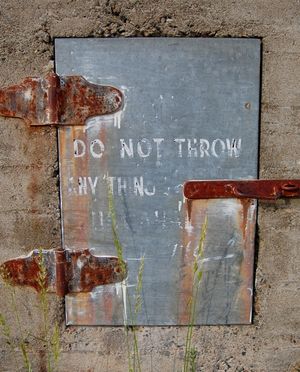The Fading Signs of Our Agricultural Memory
I took the above picture just east of Hutton Settlement on the hillside in late May. I was drawn to its rustic look but mystified by it's meaning and history. "DO NOT THROW ANYTHING..." I didn't think much more of it until last night when I did the invocation at the Hutton Settlement 90th anniversary dinner at the Davenport. I had the privilege of sitting next to Mr. and Mrs. Revel who served as Administrators at Hutton until 1996. They were at Hutton when it was still a working farm, which was what Hutton intended when he set aside the over 300 acre tract of land. It was designed to be self-sustaining and it was for much of its early life, especially during the depression years. They had a dairy and chickens and sheep and a five acre vegetable garden. They told me about taking their veggies to the community canning facility in Post Falls where they bought the cans and rented the equipment to preserve the food they had grown. They also told the story of the various ag activities that shut down through the years. First went the dairy because of the increasing regulatory burden. Then the chickens and the sheep and large garden. The Hutton household's transition away from household ag mirrors the transition in the majority of households in the Valley.
But here's the aha moment. Somewhere in the conversation the old irrigation canal that historically provided water to all the Valley farms came up. I asked if the canal served the settlement and Mr. Revel exclaimed that in fact it went right behind the buildings. That's when it dawned on me that the concrete and iron relic pictured above is a remnant of the old irrigation canal. This morning I looked closely and was able to make out the rest of the sentence, "DO NOT THROW ANYTHING IN CANAL Please".
The fading sign is a literal and metaphorical sign of our fading agricultural memory. Who remembers that the Valley was filled with over a million fruit trees not too long ago, or that it was famous for Hearts of Gold melons, or that the shores of the river going through Millwood were filled with truck farms and seasonal Indian trails. Who remembers that Ritz crackers are named after Ritzville because at the time Ritzville was the largest initial shipping point for wheat in the country? I know all this stuff is in history books and wiki articles, but I'm talking about a living history among the people. The signs are fading as is our collective memory...to our great peril.
If we are going to live storied lives, that are grounded in something more than commodities markets, it's important to preserve this agrictultural memory. I'm discovering one simple way to do that is to recover the old houshold ag practices from generations ago. Take out the lawn and grow vegetables. Learn how to preserve food. Get to know farmers and buy from them directly.
Our most recent adventure of growing chickens has been especially fruitful. I now know where the cultural understanding of "playing chicken" comes from. It comes from the common practice of chickens running at each other full force and stop[ing right before crashing into each other with feathers raised and beeks wagging. That's what my chickens do. Before observing our chickens in action my cultural understanding of this practice went about as deep as Kevin Bacon playing chicken with tractors in the movie Footloose. And yesterday I learned the origins of the phrase, "flying the coop". I opened the door to change the water in the coop and my five chickens burst past me toward the door and the best way to describe their actions is to say they "flew the coop." Aha!
Does anyone else have any Aha discoveries along these lines to report?

